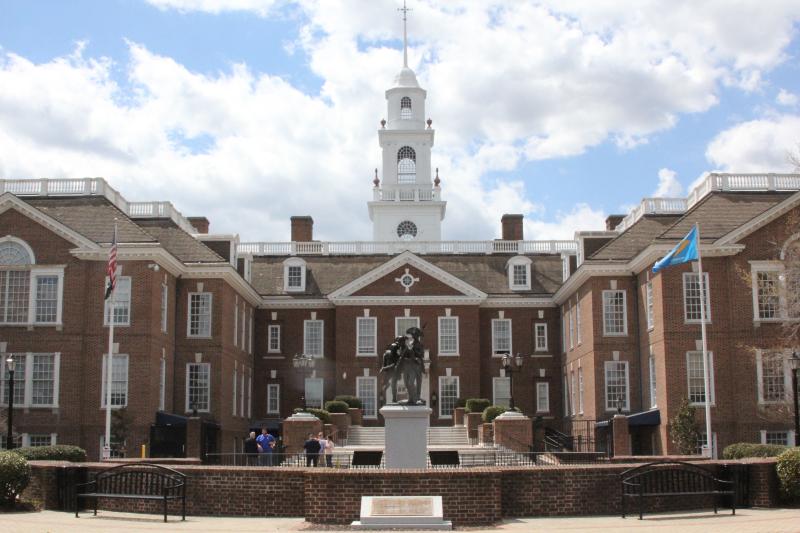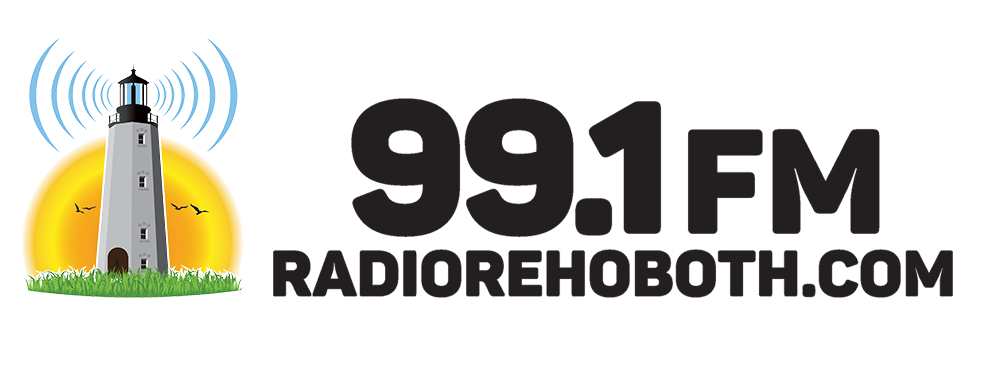-
 play_arrow
play_arrow
Radio Rehoboth

Signed into law
• HB 15 with HA1 was signed into law by Gov. John Carney March 21 after unanimously passing the Senate the same day. The bill previously unanimously passed the House March 19 to require all individual, blanket, and group health insurance policies to cover annual ovarian cancer screening tests for women at risk for ovarian cancer, and it further expands the scope of monitoring tests available to women subsequent to ovarian cancer treatment. The amendment requires all individual, blanket, and group health insurance policies to cover annual ovarian cancer screening tests for women at risk for ovarian cancer. It further expands the scope of monitoring tests available to women subsequent to ovarian cancer treatment.
Senate passed
• SR 19 passed the Senate March 26 recognizing March 25 as Greek Independence Day.
• SR 20 passed the Senate March 26 to extend thoughts and prayers from the people of Delaware to our sister state of Maryland, to the victims’ families, and to the first responders who are assisting with the search and recovery efforts.
• SB 238 unanimously passed the Senate March 27 to add “victim of kidnapping” to the definition section of the Address Confidentiality Act, allowing for kidnapping victims to become eligible for the protections offered by the Address Confidentiality Program.
Awaiting governor signature
• HS1 for HB 162 with HA3 passed the Senate by a 37-2 vote with one absent to authorize the process of natural organic reduction to be used in Delaware to accelerate the decomposition of human remains to soil. This process uses large vessels to hold human remains together with straw, wood chips or other natural materials for about 30 days. The human remains and organic materials, mixed together with warm air, are periodically turned and the process eventually results in reduction of the human remains to a soil material that can then be provided to the deceased individual’s family. Natural organic reduction is considered a more eco-friendly cremation alternative, forgoing the usage of formaldehyde and the release of carbon dioxide and mercury into the atmosphere, according to the bill. The substitute bill defines “final remains” and “last remains.” The bill passed the House Jan. 23 by a 37-2 vote with 1 not voting and 1 absent.
House Administration Committee
• HCR 98 requests the governor provide recommendations for the future of education by addressing funding, improving academic performance, standardized testing, and school safety and climate to the 153rd Delaware General Assembly by June 30, 2025
• SB 209 unanimously passed the Senate March 20 to add adult sibling of a decedent to the definition of next of kin to allow the medical examiner to release the personal property of a decedent to an adult sibling of a decedent, when there is no other next of kin. It will also allow the medical examiner to provide a copy of a post mortem examination report to an adult sibling, upon written request, when there is no other next of kin.
• SS1 for SB 212 passed the Senate March 20 with 20 votes and one not voting to codify the Bureau of Health Equity in the Division of Public Health, which includes the Office of Minority Health and the Office of Women’s Health. The purpose of the BHE is to ensure that everyone in Delaware will achieve their full health potential by eliminating health disparities, particularly among all racial and ethnic minority groups.
• HS1 for House Bill 316 would create a new election crime “use of deep fake technology to influence an election.” Under this statute, it would be a crime to distribute within 90 days of an election an audio or visual depiction that has been manipulated or created with generative adversarial network techniques, with the intent of harming a party or candidate or otherwise deceiving voters. It is not a crime, nor is there a penalty, if the altered media contains a disclaimer stating “This audio/video/image has been altered or artificially generated.” There is also provision for civil injunctive relief for a candidate depicted in a deep fake. There are various exceptions to protect speech, expression, and media rights. A violation of this statute is a class B misdemeanor unless the deepfake is intended to cause violence or bodily harm, in which case it is a class A misdemeanor, or if it is a repeat offense within five years, in which case it is a class E felony. All offenses under this section are heard in Superior Court.
• HB 319 with HA1 would require the Department of Human Resources to develop an executive branch policy restricting nepotism in state employment and prohibiting supervision of a state employee by a relative. It further requires the legislative and judicial branches, as well as offices headed by other elected officials, to develop and implement comparable policies. The amendment simplifies the provision relating to adoption of an anti-nepotism policy in parts of state government outside the executive branch.
• HB 360 would add Eid ul-Fitr and Eid ul-Adha to the list of state holidays.
House Appropriations Committee
• HB 340 would authorize the creation of Family Justice Centers within Delaware to provide victims of crime with a single source to obtain resources and support services.
• SS1 SB 82 would require state programs to provide annual reports to the General Assembly about compliance with federal and State law and regulations that require meaningful access to services for individuals with limited English proficiency and effective communication for individuals with disabilities. The act provides support for language and communication assistance for individuals renting or purchasing a home or facing eviction or foreclosure, and creates a short-term program within the Office of the Manufactured Housing Ombudsperson and the Department of Justice. This program will provide special language and communication assistance support for individuals with limited English proficiency and individuals with disabilities to better understand and participate in matters related to residential leases and evictions and home purchases and foreclosures. The Department of Justice is not required to spend more than $48,500 on translation and interpretation services, and auxiliary aids, in the fiscal year following 30 days after enactment.
House Economic Development/Banking/Insurance & Commerce Committee
• SB 166 passed the Senate March 21 by an 18-3 vote to allow for the delivery of alcoholic liquors from a restaurant, brewpub, tavern, taproom, or other entity with a valid on-premise license. The bill also provides that the acts of a licensed consumer delivery permittee or a delivery driver are not attributable to the retailer.
House Education Committee
• SB 211 passed the Senate 15-6 on March 26 to direct the Delaware Interscholastic Athletic Association to adopt javelin as an approved event for all DIAA sponsored track and field competitions.
House Health & Human Development Committee
• SB 223 unanimously passed the Senate March 26 to regulate mobile-integrated healthcare and community paramedicine by authorizing the Division of Public Health to handle applications and set standards.
House Judiciary Committee
• HS2 for HB 55 would create a bill of rights for Individuals Experiencing Homelessness to ensure that all individuals, regardless of housing status, have equal opportunity to live in decent, safe, sanitary, and healthful accommodations and enjoy equality of opportunities. The act sets forth the rights of individuals experiencing homelessness and creates a process by which the State Human and Civil Rights Commission and the Division of Human Relations may accept and investigate complaints of discriminatory treatment, attempt conciliation, and refer enforcement actions to the Department of Justice where necessary.
• HS1 for HB 270 would create a civil penalty for any sale or display of ammunition that allows the ammunition to be accessible to a purchaser or transferee without the assistance of the vendor or an employee of the vendor. Ammunition in an enclosed display case, behind a counter or other customer access preventing device is not considered accessible for purposes of this section. A violation of this section carries a penalty of $1,000 for a first offense, $5,000 for the second, and $10,000 for a third or subsequent offense.
• HB 353 would provide civil and criminal remedies for the wrongful disclosure of deep fakes that depict individuals in the nude or engaging in sexual conduct. It further provides that when an adult creates a visual depiction of a minor that is nude or engaging in sexual conduct, the adult would be subject to a felony prosecution, rather than a misdemeanor prosecution.
House Public Safety & Homeland Security Committee
• SB 235 passed the Senate March 21 with 20 votes and one absent to require Delaware to participate in a national clearing house that tracks commercial driving licenses, and prohibit CDL licenses if the driver has violated drug and alcohol law.
• SB 236 unanimously passed the Senate March 21 to extend the expiration date for any new issuance or renewal of an ADA placard from three years to eight years for a specific person with a diagnosis of a permanent disability and changing the minimum age from 85 to 80 years or older, extend the validity for a temporary disability from five weeks to 180 days, and allow additional medical professionals to certify a disability application.
House Revenue & Finance Committee
• SB 234 unanimously passed the Senate March 26 to extend the timeframe for a customer to apply for a document fee credit refund from 15 days to 30 days. This change will improve customer service by allowing a customer more time to submit the applicable paperwork.
Senate Banking, Business, Insurance & Technology
• SB 249 would amend law relating to captive insurance to provide the commissioner with additional flexibility to approve those types of financial institutions that would be authorized to hold required capital and surplus of captive insurance companies.
Senate Education Committee
• HB 23 passed the House March 21 by 31 votes with 10 absent to allow more flexibility for higher education assistance for students in foster care by allowing money to be used for direct and indirect educational expenses. It also removes the one year residency requirement for applicants.
Senate Elections & Government Affairs
• SB 254 would create the Delaware Grocery Initiative to direct the Office of State Planning Coordination to study food insecurity in urban and rural food deserts. The Act defines a food desert and directs the 0ffice to expand access to healthy foods in food deserts by providing financial assistance to grocery stores, independently owned for-profit grocery stores, cooperative grocery stores, non-profit grocery stores as well as grocery stores owned and operated by local governmental units. The act provides the office with authority to enter into contracts, grants, or other agreements to administer grants and other financial support, including technical assistance. It further authorizes the office to adopt and promulgate rules and regulations to implement and administer this initiative.
• HB 299 passed the House March 26 by 1 30-5 vote with six absent to add public libraries to the definition of place of public accommodation for purposes of Delaware’s Equal Accommodations Law. It also directs the Delaware Library Consortium to develop and adopt common policies concerning collection, development, and other topics in order to ensure equitable access and the right to read for all Delawareans.
• HS1 for HB 304 with HA1 passed the House with 37 votes and four absent March 26 to require all individuals applying for employment with the Department of Technology and Information undergo a state and federal criminal background check through the State Bureau of Identification. The bill is in the House Technology & Telecommunications Committee.
Senate Environment, Energy & Transportation Committee
• HS1 for HB 19 passed the House March 26 by 34-1 vote with six absent to create a background special license plate for the United Way of Delaware Pride Council.
• HB 328 passed the House March 21 with 32 votes and nine absent to extend a sunset clause to 2030 for motorcyclists to use pulsating headlights as a way to alert other drivers of their presence, without allowing the use of flashing lights that would otherwise be used on emergency vehicles.
Senate Finance Committee
• SB 13 would create the Hospital Quality Assessment, which places a 3.58% assessment on Delaware hospitals’ net patient revenues. With the exception of 10% that may be used to support existing Medicaid obligations, 53.5% of net funds generated by the Hospital Quality Assessment must be used to increase the inpatient and outpatient payments to hospitals, and 46.5% must be deposited into the Hospital Quality and Health Equity Fund, to be used to develop or enhance funding for Medicaid initiatives, unlocking federal matching dollars.
• SB 215 with SA1 and SA2 would require the Department of Health and Social Services to inspect long-term care facilities on an annual basis.
• SB 227 would create dedicated information technology units for Delaware public schools, instead of using a unit for a teacher.
• SB 240 introduced March 13 would require the Division of Medicaid and Medical Assistance to produce a report by March 31, 2025, that documents home care services as measured using the most common billing codes for the home care industry.
• SB 245 removes the expiration dates for the Office of Foreclosure Prevention and Financial Education and the Residential Mortgage Foreclosure Mediation Program to assist homeowners at risk of foreclosure or already navigating the foreclosure process.
Senate Health & Social Services
• SB 251 revamps and renames the Delaware Institute of Veterinary Medical Education to the Delaware Veterinary Medicine Education Advisory Council, and provides the council work with both the Department of Education and the Department of Agriculture to establish a robust program that assists Delaware students interested in practicing veterinary medicine, encourages the students to return to Delaware to practice, and develops programs of education and training in veterinary medicine-related fields and research.
• HB 345 passed the House March 26 with 37 votes and four absent to require Medicaid coverage for additional postpartum visits with a doula upon recommendation of a licensed practitioner or clinician.
• HB 348 sponsored by Rep. Pete Schwartzkopf, D-Rehoboth, passed the House March 26 with 36 votes, four absent and one not voting to remove the requirement for a lifeguard at a pool exclusively serving a residential or apartment community not accessible to the general public. This legislation aligns the statutory and regulatory requirements so that the lifeguard requirement in a rental community is the same as for a single family residential community, hotel, motel, and campground.
• SJR 6 would direct health care professional licensure boards to review their existing professional licensure application language to revise or remove all intrusive and stigmatizing language around mental health care and treatment and replace it with language that meets the threshold requirements of the Americans with Disabilities Act of 1990.
Senate Housing and Land Use
• SB 23 would require counties and municipalities in Delaware to develop ordinances that allow for the construction of in-law suites or garage apartments on single-family homes to help increase Delaware’s housing supply.
• SB 247 would protect residents of manufactured housing communities from landlords who seek to impose rent increases even while refusing to address outstanding health and safety violations.
Senate Labor Committee
• SB 229 would extend the right of employees to inspect their own personnel files to former employees, and updates the specific information included in personnel files that an employee may inspect.
• SB 255 would provide that a prime general contractor is jointly and severally liable for a violation of the Wage Payment and Collection Act that is committed by a subcontractor, regardless of whether the subcontractor is in a direct contractual relationship with the prime general contractor; authorizes the Attorney General to bring an action to collect wages under the Wage Payment and Collection Act; and provides that a prime general contractor is jointly or severally liable for a violation of the Delaware Contractor Registration Act by a subcontractor.
• SB 256 would clarify the Attorney General’s existing authority to enforce the state’s consumer protection laws, specifically the Attorney General’s ability to pursue nonpenalty civil remedies, such as damages and restitution, without having to show that a person’s violation of a law or regulation enforced by the Department of Justice’s Division of Consumer Protection was wilful.
Concurrent resolutions
Passed House and Senate March 21
• SCR 128 recognizing Christian Holy Week and Passover.
• HCR 96 designating March 21, 2024 as “Rock Your Socks for World Down Syndrome Day.”
• HCR 97 makes April 2024 “Sikh Awareness and Appreciation Month.”
• HCR 99 recognizes March 21, 2024, as “Rosie the Riveter Day.”
Go to Source:https://www.capegazette.com/article/legislative-wrap/273003
Author:
Written by: RSS
Chart
Top popular

News Briefs 10/17/23
Board of Commissioners Workshop & Special Meeting – November 6

Six Sussex road projects considered in latest CTP
Knicks vs. Cavaliers prediction, odds, line, spread, time: 2023 NBA picks, Nov. 1 best bets from proven model
Tamar Braxton Says ‘Tamar 2.0’ Era Is More ‘Grown Up’ (Exclusive)
Copyright 2023 East Sussex Public Broadcasting, Inc.






